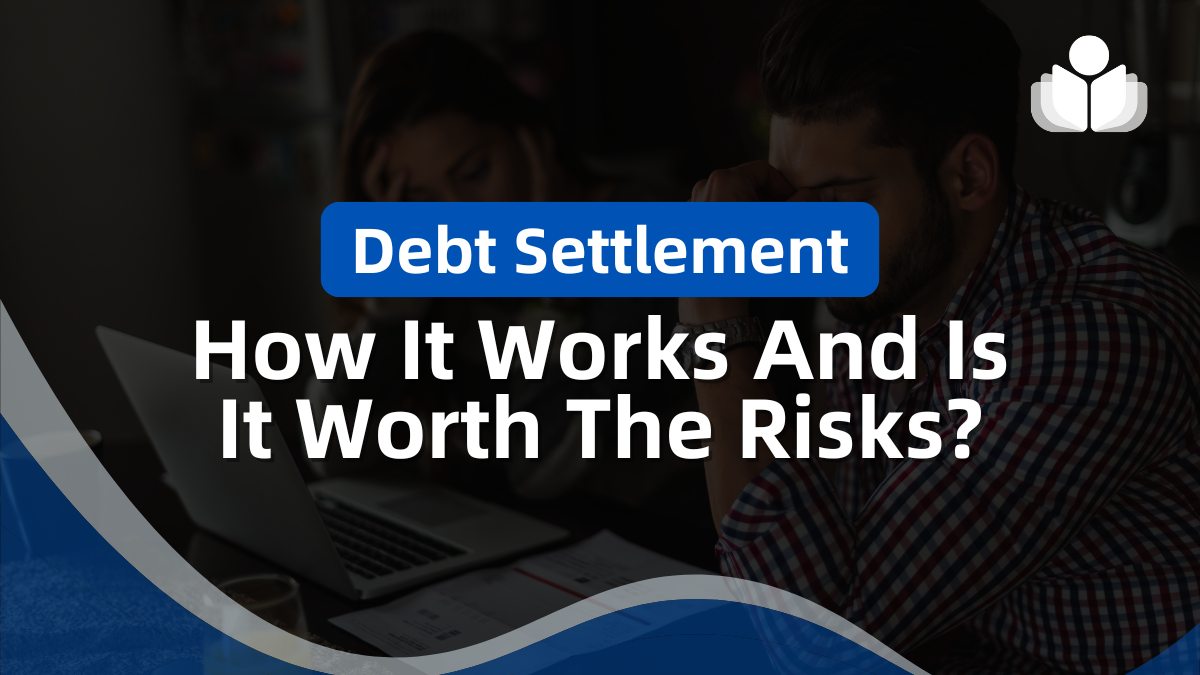When you’re dealing with overdue debt, you might find yourself questioning whether debt settlement is the right solution. Depending on your chosen path, it could be a viable option, either working with a third-party debt settlement company or negotiating the debt on your own.
Experts caution that hiring a debt settlement company can be an expensive and risky choice. A DIY settlement plan might be effective, but it’s challenging to implement.
Keep reading to discover the details of working with a debt settlement company.
>> Explore Debt Settlement Options – Start Now! >>
The Basics of Debt Settlement
Debt settlement, sometimes called debt negotiation, involves paying off debt by offering a single lump sum that’s usually far less than the total amount owed.
For those in debt, this approach can bring financial relief and help them rebuild their credit. Creditors benefit by recovering at least a portion of the money they’re owed, which is better than receiving nothing at all.
Additionally, debt settlement might help the borrower avoid filing for bankruptcy, though some experts suggest that bankruptcy could be the better option in certain situations. Debt settlement typically targets credit card debt, but it can also be applied to other types of unsecured debt.
>> Find Out If Debt Settlement Is Right for You >>
How Debt Settlement Works
Handling debt settlement through a company is different from tackling it on your own. Here’s what to expect when you hire a debt settlement company:
- Research Debt Settlement Companies: There are several reputable debt settlement companies in the U.S., with most states requiring them to be licensed. These companies should follow industry rules designed to protect consumers and their money.
- Exercise Caution: Be wary if a debt settlement company promises specific outcomes. They can’t guarantee that a creditor will agree to a settlement. During your research, check resources like the Better Business Bureau, your state attorney general’s office, and agencies like the Consumer Financial Protection Bureau (CFPB).
- Ask About Costs: Once you’ve identified a potential company, ask about their fees. If they avoid answering, it could be a red flag. Typically, these companies charge a fee ranging from 15% to 25% of either the original debt amount or the settled amount. For example, if you have $10,000 in debt and settle for $5,000, you might pay an additional $750 to $1,250 in fees.
- Review Your Finances: Debt settlement companies often require you to deposit money into a special savings account for 24 months or more before settling your debt. These payments contribute to the lump-sum settlement. However, keeping up with these payments can be challenging, and failing to do so might lead you to abandon the agreement before the debt is fully settled. Review your budget to ensure you can manage these payments for the required period.
- Ask About the Timeline: Debt settlement typically takes two to four years to complete. During this time, you might accumulate interest and fees from your creditors besides the fees from the settlement company. This can happen because settlement companies may advise you to stop paying your creditors and instead redirect that money to your savings account. This can lead to debt collectors contacting you or even lawsuits.
- Choose a Debt Settlement Company: If you understand the risks and are ready to proceed, select a debt settlement company based on your research.
- Clarify the Details: Before signing up, make sure you understand the timeline and the fees involved. Also, ask how much of your initial payments will go toward the company’s fees and the total amount you’ll end up paying.
- Understand the Tax Implications: The IRS considers any forgiven debt over $600 as taxable income. So if you settle a $10,000 debt for $5,000, the forgiven $5,000 could be taxed.
>> Learn About Debt Settlement Today! >>
The Risks of Debt Settlement
Debt settlement can be a double-edged sword, depending on your circumstances. Here are some potential risks you should consider.
Negotiation Problems
Your creditor might turn down the settlement offer. In that case, you and the debt settlement company might need to make a counteroffer. You could also find yourself needing to negotiate directly with the original creditor to set up a payment plan. In the worst-case scenario, you might end up owing even more than before, and a rejected settlement offer could push you closer to bankruptcy.
Increased Debt
Fees from the debt settlement company, along with additional fees and interest from your creditor, could significantly increase your debt, sometimes by hundreds or even thousands of dollars.
Negative Impact on Credit Score
Since creditors are often willing to settle only when they believe it’s their last chance to get paid, your accounts might already be overdue or will become overdue as you make payments to the debt settlement company. This can cause a substantial drop in your credit score, potentially over 100 points, and the damage can be long-lasting. A debt settlement will stay on your credit report for at least seven years.
>> Visit Freedom Debt Relief >>
Best Debt Settlement Companies
Freedom Debt Relief

Freedom Debt Relief assists with various types of unsecured debt, including payday loans and private student loans. However, the services can be pricey because, if successful, the company charges a percentage of your original debts, not just the settled amount. On the plus side, Freedom Debt Relief offers a “program guarantee” that may limit the fees in certain situations.
They provide a free consultation to review your financial situation. While there are no upfront fees, you’ll need to open a savings account with a third party. Freedom Debt Relief is transparent about the costs: a one-time setup fee of $9.95 and a monthly charge of $9.95.
Though this is higher than typical savings accounts offered by banks, it’s fairly common among debt relief companies.
>> Get Started With Freedom Debt Relief >>
National Debt Relief

If you’re overwhelmed with significant debt, National Debt Relief is a well-regarded company that has helped over 600,000 clients since 2009, handling debt amounts of $100,000 or more.
National Debt Relief customizes its plans to fit your needs, aiming to help you regain financial stability within 24 to 48 months. They specialize in negotiating with creditors to reduce high-interest debt. The service fee ranges from 15% to 25% of the enrolled debt, and they offer a money-back guarantee.
>> Get Started With National Debt Relief >>
Pacific Debt Relief

Pacific Debt Relief charges settlement fees between 15% and 25% of the settled debt, similar to our top pick for debt settlement, although its overall rating is slightly lower. While their website mentions fees based on total enrolled debt, a company representative clarified that the fees are actually based on the settled debt amount, which could be more affordable.
Pacific Debt Relief has earned a strong reputation, according to online reviews. Nearly 1,500 customers have given them an average rating of 4.7 out of 5 stars. Their Better Business Bureau (BBB) rating is even higher, at 4.93 stars out of 5, based on a similar number of reviews.
>> Get Started With Pacific Debt Relief >>
Is Debt Settlement a Good Idea?
The Consumer Financial Protection Bureau (CFPB) warns consumers about the risks of debt settlement. Engaging with these companies can be risky, and the CFPB suggests considering other options first (which we’ll discuss later). Before deciding, keep these risks in mind:
- Impact on Your Credit: If your accounts aren’t already overdue, they will become delinquent once you start redirecting payments into the settlement account. Delinquent accounts and debts that lenders charge off will remain on your credit report for seven years.
- Penalties and Interest: When you stop making payments on your debts, you’re likely to face penalties like late fees. Interest may also continue to accumulate, increasing the total amount you owe.
- Settlement Fees: Debt settlement companies usually charge a percentage of each debt they settle based on the debt’s balance when you enroll. Some companies charge a percentage of the debt amount that’s eliminated through the settlement.
- Additional Fees: Besides the settlement fee, you might have to pay other fees, like a setup fee to open the dedicated escrow account and a monthly maintenance fee for that account.
- Tax Implications: The IRS considers forgiven debt as taxable income. It’s a good idea to consult a tax professional to understand the potential tax obligations you’ll incur if you settle your debt.
- Uncertain Outcomes: There’s no guarantee that debt settlement will succeed. Not all creditors will work with settlement companies, and even if they do, they might not accept the settlement offer. Depending on how long the settlement process takes, the fees and interest that pile up could negate any savings.
>> Explore Debt Settlement Options – Start Now! >>
Alternatives to Debt Settlement
If you’re feeling overwhelmed by debt, there are several options available that carry less risk than debt settlement, whether you’re considering using a debt settlement company or trying to negotiate on your own. Here are four alternatives to consider:
Balance Transfer
You can move your debt to a credit card offering a 0% APR for an introductory period, sometimes lasting up to 18 months. If you manage to pay off the balance within this period, you can avoid paying interest on the debt entirely.
Debt Consolidation Loan
A debt consolidation loan allows you to merge multiple debts into a single, manageable monthly payment, often with a lower interest rate than what you’re currently paying.
Nonprofit Credit Counseling
Meeting with a counselor at a nonprofit credit counseling agency can help you regain financial stability. A credit counselor can assist you in creating a budget, suggest debt consolidation options, advise on whether to close some credit card accounts or even provide guidance on bankruptcy.
Debt Management Program
Another tool offered by nonprofit credit counselors is a Debt Management Program (DMP). If you enroll in a DMP, the counselor will work with your creditors to create a repayment plan that consolidates your debts into one monthly payment, which may be lower than the total of your current payments.
>> Learn About Debt Settlement Today! >>
Frequently Asked Questions
The Bottom Line
If you’re feeling overwhelmed by debt or facing financial challenges, debt settlement might offer a way out. However, before committing to this option, ensure you’ve explored other alternatives and weigh the advantages and disadvantages of settling on your own or using a third-party service.
To figure out which approach suits you best, take the time to assess your financial situation, capabilities, and potential outcomes. Also, keep in mind that if your debt settlement strategy isn’t going as expected, you can always switch to a different plan.
 Sections of this topic
Sections of this topic
















